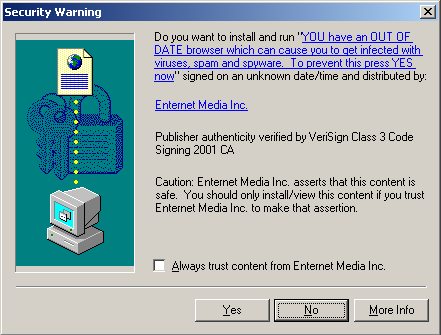How to Get Rid of Spyware
This document will give you some basic information about spyware, what it is, what it does, where it comes from, and how to get rid of it. It is not an in-depth article about spyware.
Quick links:
- What is spyware?
- How did I get infected with spyware?
- How can I avoid spyware?
- What does spyware do?
- How do I get rid of spyware?
- Links to spyware removal tools
What is spyware?
From Wikipedia, the free encyclopedia:
Malicious websites may attempt to install spyware on readers' computers.

In this screenshot a spamblog has triggered a pop-up that offers spyware in the guise of a security upgrade.
In the field of computing, the term spyware refers to a broad category of malicious software designed to intercept or take partial control of a computer's operation without the informed consent of that machine's owner or legitimate user. While the term taken literally suggests software that surreptitiously monitors the user, it has come to refer more broadly to software that subverts the computer's operation for the benefit of a third party.
Spyware differs from viruses and worms in that it does not usually self-replicate. Like many recent viruses, however, spyware – by design – exploits infected computers for commercial gain. Typical tactics furthering this goal include delivery of unsolicited pop-up advertisements; theft of personal information (including financial information such as credit card numbers); monitoring of Web-browsing activity for marketing purposes; or routing of HTTP requests to advertising sites.
To sum it up, spyware is bad, sneaky, useless for you, annoying at best and very dangerous at worst (identity theft for example!).
How did I get infected with spyware?
From Wikipedia again, "spyware gets on a system through deception of the user or through exploitation of software vulnerabilities. The most direct route by which spyware can infect a computer involves the user installing it. [...] many spyware programs deceive the users, either by piggybacking on a piece of desirable software, or by tricking the users to do something that installs the software without them realizing. Recently, spyware has come to include "rogue anti-spyware" programs, which masquerade as security software while actually doing damage."
In short, you get spyware by clicking a Yes button on a dialog box too quickly, or when you fail to read the fine lines of the licence agreement when you install a new piece of software (remember, spyware can piggyback on a piece of desirable software) and "agree" to install that piece of software. Most of the time, you are tricked into installing spyware on your computer, and do it without even suspecting it.
How can I avoid spyware?
A good way to avoid spyware is to read thoroughly all the licences agreements when you install a program, looking for paragraphs dealing with a suspicious third party software. Pay especially attention to freeware programs, many of them being free for a reason: they install a piece of spyware without letting you know. Thankfully, it is not the case for all free programs.
Another way to avoid spyware is to take the time to read the dialog boxes coming from your web browser, since a lot of spyware is spread through websites.
Whenever in doubt, do not hesitate to look up the name of the program you are about to install on Google for example, and see if people report it as spyware or as bundled with spyware.
You can also download your software from cleansoftware.org, that offers software that is certified not to contain any spyware.
What does spyware do?
The presence of a piece of spyware on your computer can have many effects. First, it can attract more pieces of spyware. If your computer is infected, you will probably notice unexpected behavior of your computer. For example, your home page mysteriously changed to a website you've never heard of, or you suddenly see advertisements pop up on your screen.
If you are infected, you will mostly notice a significant degradation of your computer's performance. Spyware tend to eat a lot of resources and make your computer slower than before, even sometimes crawling!
Moreover, some spyware can interfere with your networking software and make it very difficult to connect to the Internet.
But that's not all. Spyware can be much more dangerous than just a resources hog. Some spyware attempts to steal private information from your computer and "phone home" to give it to its creator. It can lead to identity theft and fraud.
How do I get rid of spyware?
If some extreme circumstances, the only efficient way to sanitize a spyware infected computer is to format the hard drive and reinstall the operating system from scratch, leaving no residue of your former installation.
There are thankfully some less drastic ways of dealing with spyware. Prevention is one of them, and this includes using an Internet Firewall and maintaining your antivirus software up to date. But even the most careful persons are likely to install spyware without their consent.
To remove spyware, you can use many different programs. You can download some spyware removal programs for free from the Internet, and you can purchase some. Here's a list of popular spyware removal programs. They work pretty much like an antivirus program, from the user's point of view: you need to scan your computer on a regular basis, and to maintain the spyware definitions up-to-date as often as possible. Whenever a piece of spyware is detected, your spyware removal program attempts to destroy it. It is always a good idea to run successive scans until no more spyware is detected.
- Lavasoft Ad-Aware Personal Edition
- Spybot Search and Destroy
- Microsoft Windows Defender
- Spyware Blaster (not exactly a spyware scanner, but a useful application)
Retail spyware removal tools:
- Webroot Spy Sweeper
- Spyware Doctor
- For more options, click here.
